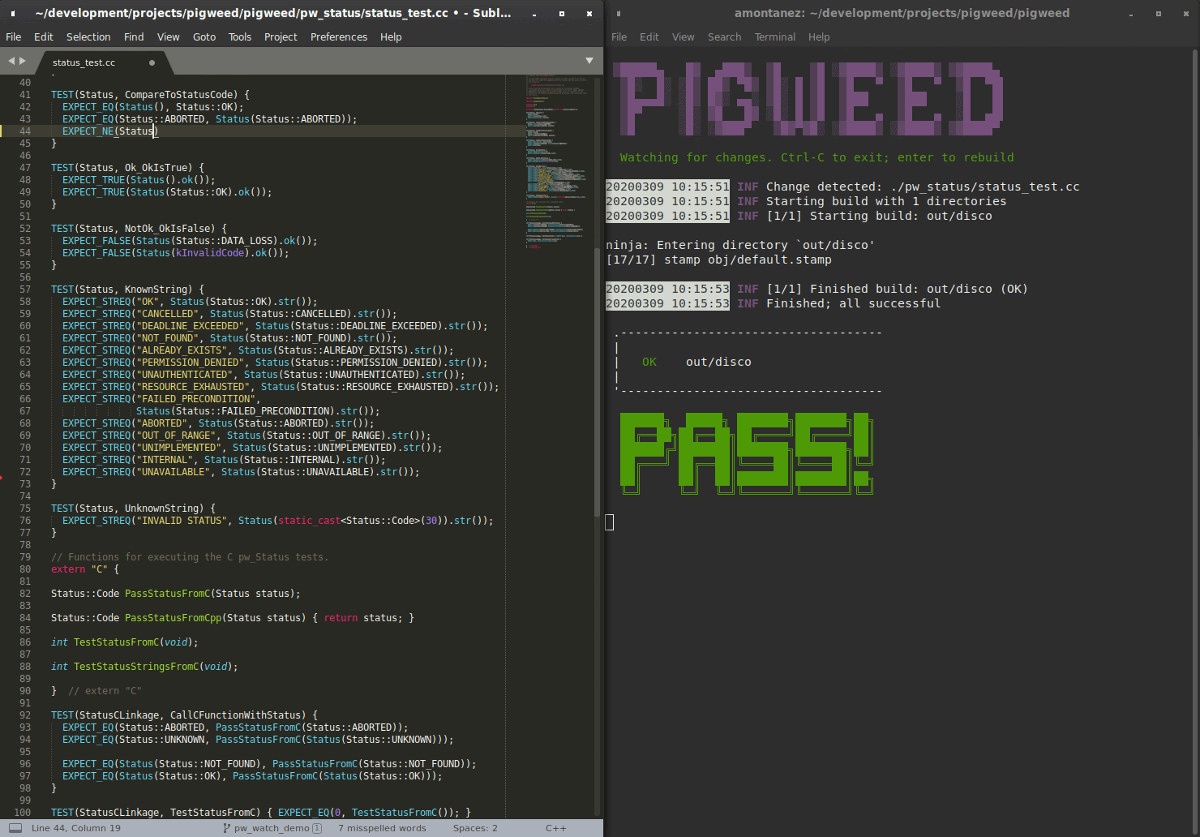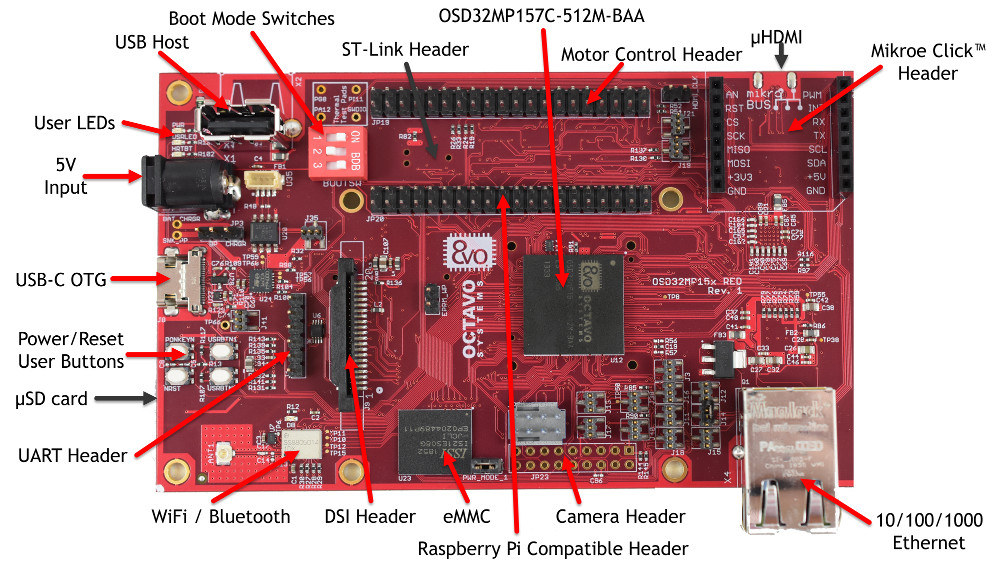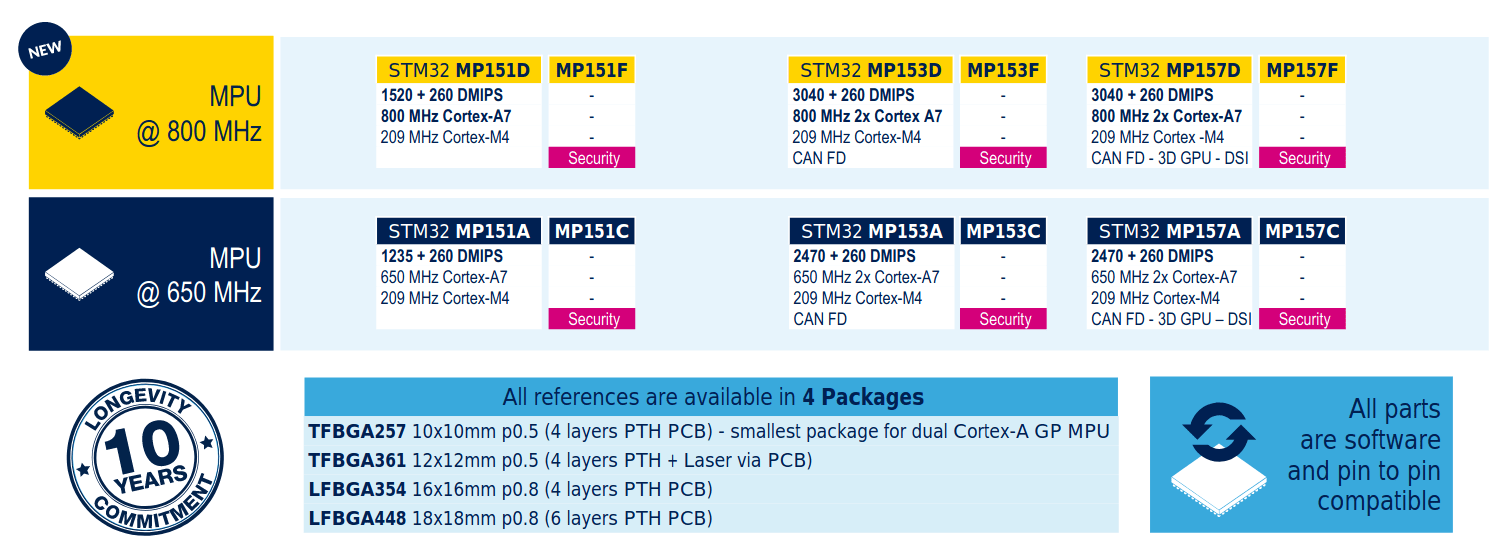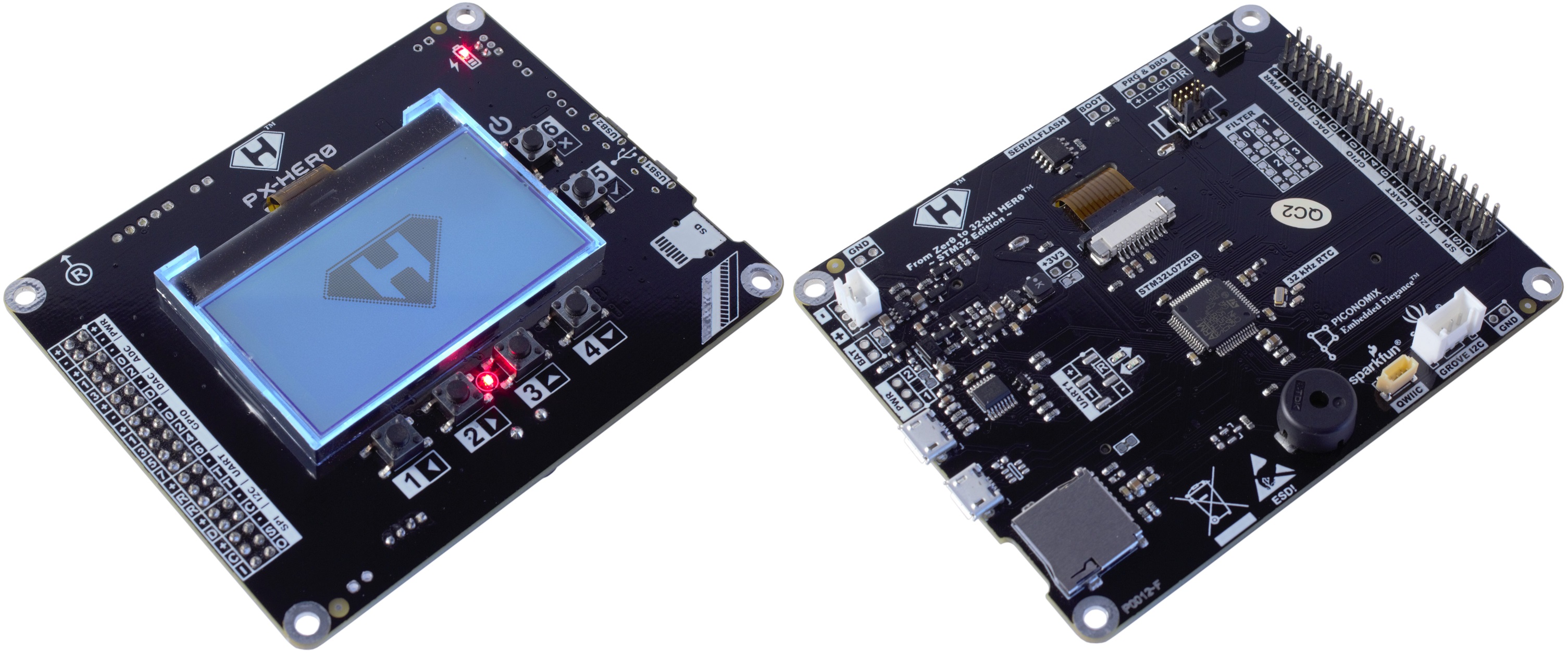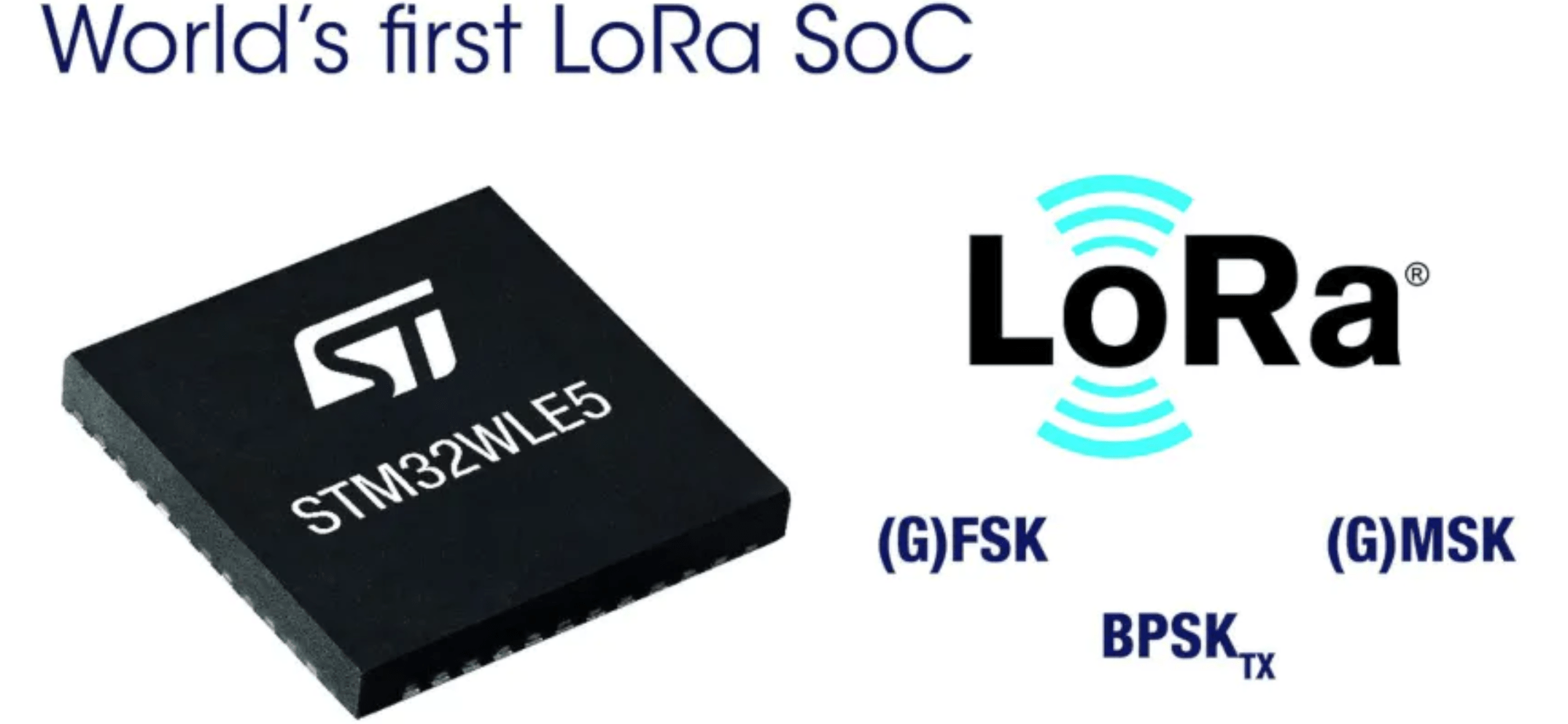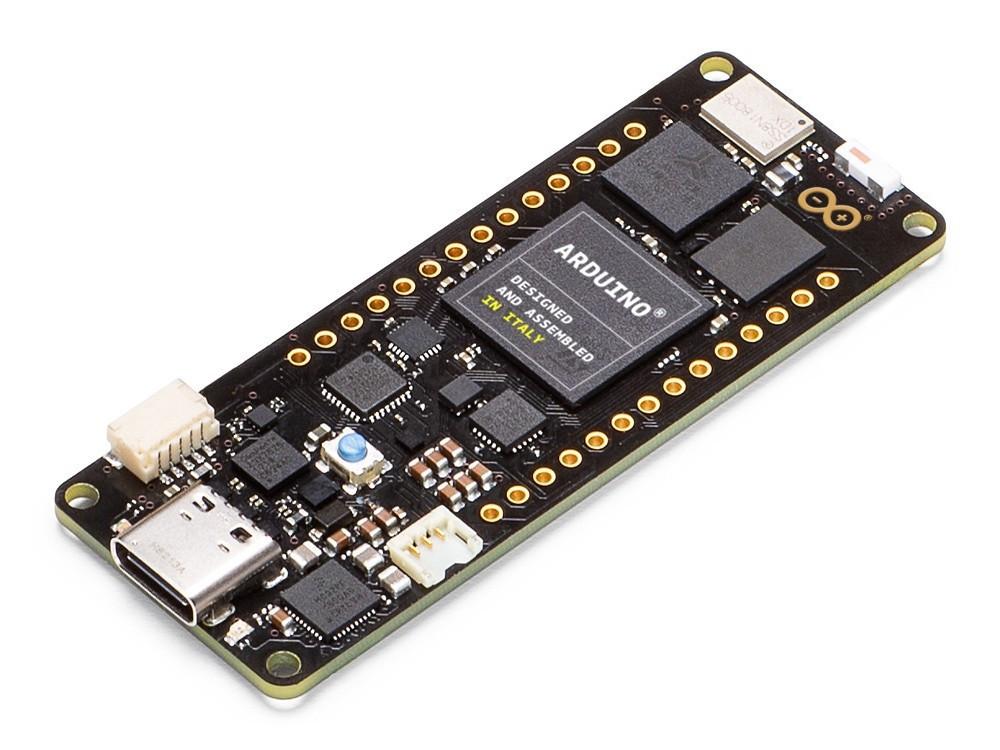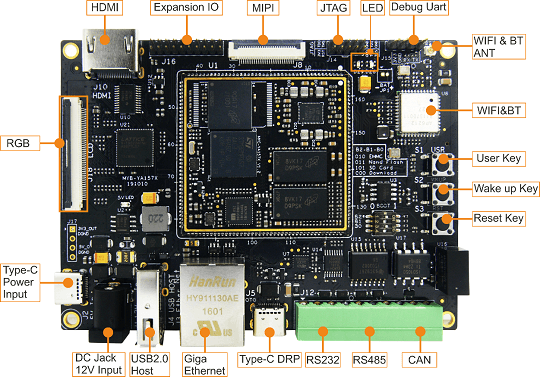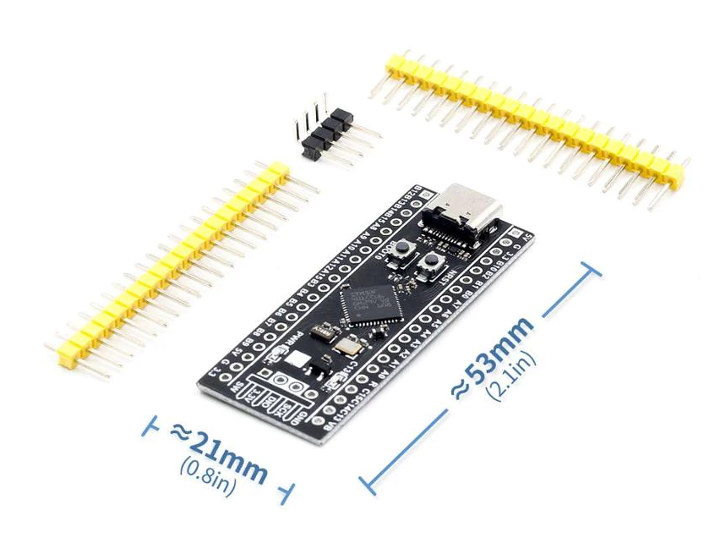There are many components required for embedded software development, including cross-toolchain, a build system like buildroot or YoCto Project, and debugging tools like OpenOCD. Once you’ve installed those, development involving several steps including building the code, flashing it to the board, and then running the program on the target. Google would like to make embedded software development to be as easy as web development as possible, similar to editing a file and running it in a web browser, so they’ve just released Pigweed open-source collection of embedded-targeted libraries/modules to streamline the development process for 32-bit microcontrollers such as STMicro STM32L452 or Nordic Semi nRF52832. Pigweed aims to help all steps of the process including tools/environment setup, program development, and code submission. Setup consists of running a bootstrap script that will automatically install tools such as Python 3.8, clang-format, and an Arm compiler in a virtual environment in order to leave […]
Octavo Systems Announces Development Boards based on OSD32MP1 System-in-Package (SiP)
Announced in February 2019, STM32MP1 Cortex-A7/M4 processor family recently got an update with 24 new SKU’s boosting the Cortex A7 core frequency to 800 MHz instead of just 650 MHz for the SoC’s announced last year. One of the first companies to take advantage of the new parts will be Octavo Sytems that unveiled OSD32MP1 system-in-package (SiP) last year combining STM32MP15x MPU, up to 1GB RAM, 4K EEPROM, STPMIC1 power management IC, two oscillators, and over 100 passive components into a single chip. The company also introduced two upcoming development kits for the STM32MP1 based SiP: OSD32MP1-BRK “Flexible Prototyping Platform” and the more featured OSD32MP1-RED evaluation & development board. Both boards are supported by OpenSTLinux which we covered in our previous articles about STM32MP1. OSD32MP1-BRK Breakout board for OSD32MP1 SiP The first board aims to provide easy access to the I/O of the STM32MP1 processor via breadboard compatible headers, and […]
STMicro Updates STM32MP1 Family with 800 MHz Cortex-A7 Processors
Until last year, all STM32 microcontrollers were based on Arm Cortex-M “MCU” cores, but that changed with the introduction of STM32MP1 Cortex-A7 + Cortex-M4 processor a year ago. That meant for the first time, we had an STM32 processor with an MMU capable of running Linux or Android. The company had three product lines: STM32MP157 – Dual Cortex-A7 cores @ 650 MHz, Cortex-M4 core @ 209 MHz, 3D GPU, DSI display interface and CAN FD STM32MP153 – Dual Cortex-A7 cores @ 650 MHz, Cortex-M4 core @ 209 MHz and CAN FD STM32MP151 – Single Cortex-A7 core @ 650 MHz, Cortex-M4 core @ 209 MHz All available in four different packages, and with or without hardware security (parts with A and C suffix) meaning we had a total of 24 parts. STMicro has now announced 24 more parts whose main and only difference compared to the STM32MP1 processors launched last year […]
PX-HER0 ARM Cortex-M0 Development Board and Ecosystem is for Beginners and Veterans (Crowdfunding)
PX-HER0 ARM Cortex Development Board and Ecosystem Piconomix is offering an embedded Arm Cortex-M0 development board that is aimed at the education, beginner maker, and enthusiast crowd. The PX-HER0 is a development board with an ecosystem of sourcing materials for learning the entire ARM structure through an open-source C library and full documentation. The Basics of the Board The PX-HER0 is a low-power board, running an STM32 MCU with an Arm Cortex-M0 core. There is an LCD Display, that is viewable even in direct sunlight, and the entire package is lightweight and very functional. Mass Storage To activate the bootloader, a double-tap of the RESET button, and the mass storage drive HERO-BOOT appears in the host computer. Drag and Drop are active and the UF2 file can be dragged right to the drive. The Ecosystem The ecosystem for the PX-HER0 is backed by an extensive C Library and documentation […]
STMicro STM32WL is the World’s First LoRa SoC
There is no denying that the Internet of Things is going to disrupt a lot of markets and it’s already happening to some extent. The question being asked is: “What IoT connectivity technology will lead this disruption era?”. One major technology in this connectivity race is LoRa. LoRa’s long-range, low-power, small footprint, simplicity, and the amazing community backing it, have allowed it to find its way into various applications while gaining for the top LPWAN IoT connectivity technology. STMicroelectronics, one of the biggest semiconductor manufacturer, also believes in the potential of LoRa with the launch of STM32WL, making it the World’s first die-integrated LoRa System-on-Chip. Traditional LoRa embedded platforms usually involve the need for a separate MCU chip and different LoRa transceiver chips either coupled together in one single package or separately. This undoubtedly adds extra design complexity, size, and even cost. STMicro hopes to address this with their STM32WL SoC. […]
Arduino Portenta H7 STM32H7 Cortex- M7/M4 Industrial Board Runs Arduino Code, Python and JavaScript
Arduino is now at CES 2020 promoting its Arduino Pro all-in-all IoT solution for professionals with the Arduino Pro IDE, Arm Pelion IoT platform for device management, and a new Portenta industry-grade board family starting with Arduino Portenta H7 board powered by STMicro STM32H7 dual-core Arm Cortex-M7/M4 microcontroller. Arduino Portenta H7 Specifications: Microcontroller – STMicro STM32H747XI Cortex-M7 @ 480 MHz + M4 @ 200 MHz MCU with 2MB dual-bank Flash memory, 1 MB RAM, Chrom-ART graphical hardware accelerator System Memory – 2MB SDRAM (upgradeable up to 64MB) Storage – 16MB QSPI NOR Flash (Upgradeable up to 128MB) Connectivity 2.4GHz WiFi 802.11b/g/n up to 65 Mbps and Bluetooth 5.1 BR/EDR/LE via Murata 1DX module On-board 10/100M PHY Video I/F – MIPI DSI & 8-bit camera interfaces via 80-pin expansion connector, DisplayPort over USB-C port USB – 1x USB 2.0 Type-C port for power (PD), programming, and DisplayPort output I/Os Arduino MKR […]
MYIR Launches SoM & Development Board based on STM32MP1 Microprocessor
MYIR, the Chinese based company that has developed several ARM-based hardware solutions, has introduced a new SoM powered by the ST’s STM32MP1 microprocessor called the MYC-YA157C CPU Module with an accompanying development board known as the MYD-YA157C development board. Early last year, STMicro announced the introduction of the STM32MP1, the first STM32 MPU (Microprocessor Unit) that features one or two Arm Cortex-A7 cores running Linux, as well as an Arm Cortex-M4 real-time core making it possible to use previous STM32 codes on the new unit. Although, less than 1-year-old, the STM32MP1 microprocessor has since be deployed on a couple of development boards like the STMicro’s own discovery kits and evaluation platform, Emtrion emSBC-Argon, PanGu single-board computer, and even octavo systems unveiled the OSD32MP15x system-in-package. One primary observation with these other developments boards is their relatively steep cost, and something MYIR aims to address. MYiR MYC-YA157C STM32MP1 CPU Module The MYC-YA157C […]
$3 STM32 “Black Pill” Board Features STM32F4 Cortex-M4 MCU, Optional SPI Flash
STM32 “Blue Pill” is a popular and cheap (>$2) development board based on STMicro STM32F103C8T6 Arm Cortex-M3 microcontroller and programmable with the Arduino IDE. I’ve just been informed that the board got an upgrade of sorts with a “Blue Pill 2” board featuring either STM32F401CCU6 or STM32F411CEU6 Arm Cortex-M4F microcontroller, and a USB Type-C port for power and programming. It’s black, so instead, I’ll call Black Bill as some others appear to do. Specifications for the Blue Pill & Black Pill boards (new features in bold): MCU (one of the other) STMicro STM32F103C8T6 ARM Cortex-M3 MCU @ 72 MHz with 64KB flash memory, 20KB SRAM. STMicro STM32F401CCU6 Arm Cortex-M4F MCU @ 84 MHz with 256 KB flash, 64KB SRAM STMicro STM32F411CEU6 Arm Cortex-M4F MCU @ 100 MHz with 512KB flash, 128KB SRAM Storage – Footprint for SPI flash USB Blue Pill – 1x micro USB port for power and programming […]


